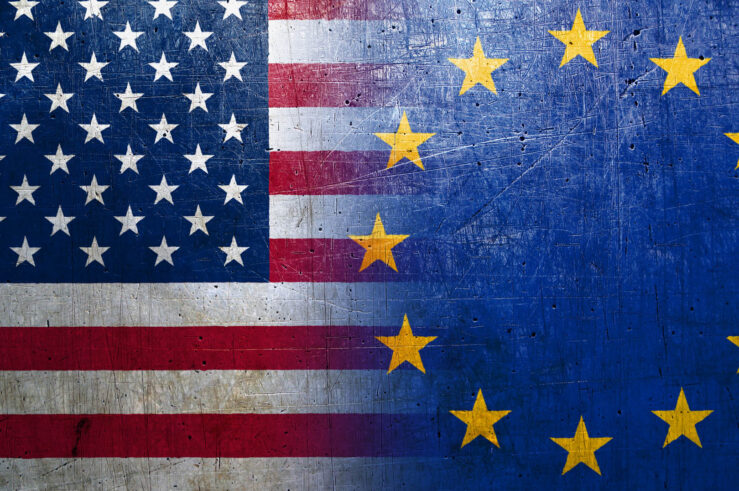Showing archive for: “Health Care”
How US and EU Competition Law Differ
U.S. and European competition laws diverge in numerous ways that have important real-world effects. Understanding these differences is vital, particularly as lawmakers in the United States, and the rest of the world, consider adopting a more “European” approach to competition. In broad terms, the European approach is more centralized and political. The European Commission’s Directorate ... How US and EU Competition Law Differ
Old Ideas and the New New Deal
Over the past decade and a half, virtually every branch of the federal government has taken steps to weaken the patent system. As reflected in President Joe Biden’s July 2021 executive order, these restraints on patent enforcement are now being coupled with antitrust policies that, in large part, adopt a “big is bad” approach in ... Old Ideas and the New New Deal
The Klobuchar Bill’s Not-So-Bright Lines for Antitrust Scrutiny
In a recent op-ed, Robert Bork Jr. laments the Biden administration’s drive to jettison the Consumer Welfare Standard that has formed nearly half a century of antitrust jurisprudence. The move can be seen in the near-revolution at the Federal Trade Commission, in the president’s executive order on competition enforcement, and in several of the major ... The Klobuchar Bill’s Not-So-Bright Lines for Antitrust Scrutiny
ICLE at the Oxford Union
Earlier this year, the International Center for Law & Economics (ICLE) hosted a conference with the Oxford Union on the themes of innovation, competition, and economic growth with some of our favorite scholars. Though attendance at the event itself was reserved for Oxford Union members, videos from that day are now available for everyone to ... ICLE at the Oxford Union
A First Glance at the Biden Executive Order on Competition: The Good and the Bad (Including Much that Looks Ugly)
The Biden Administration’s July 9 Executive Order on Promoting Competition in the American Economy is very much a mixed bag—some positive aspects, but many negative ones. It will have some positive effects on economic welfare, to the extent it succeeds in lifting artificial barriers to competition that harm consumers and workers—such as allowing direct sales ... A First Glance at the Biden Executive Order on Competition: The Good and the Bad (Including Much that Looks Ugly)
Build Broadband Better: Focus on Competition, Not Competitors
President Joe Biden named his post-COVID-19 agenda “Build Back Better,” but his proposals to prioritize support for government-run broadband service “with less pressure to turn profits” and to “reduce Internet prices for all Americans” will slow broadband deployment and leave taxpayers with an enormous bill. Policymakers should pay particular heed to this danger, amid news ... Build Broadband Better: Focus on Competition, Not Competitors
Dynamic Merger Efficiencies: The Case of Pharmaceutical Markets
The recent launch of the international Multilateral Pharmaceutical Merger Task Force (MPMTF) is just the latest example of burgeoning cooperative efforts by leading competition agencies to promote convergence in antitrust enforcement. (See my recent paper on the globalization of antitrust, which assesses multinational cooperation and convergence initiatives in greater detail.) In what is a first, ... Dynamic Merger Efficiencies: The Case of Pharmaceutical Markets
Bad Blood at the FTC
John Carreyrou’s marvelous book Bad Blood chronicles the rise and fall of Theranos, the one-time Silicon Valley darling that was revealed to be a house of cards.[1] Theranos’s Svengali-like founder, Elizabeth Holmes, convinced scores of savvy business people (mainly older men) that her company was developing a machine that could detect all manner of maladies from ... Bad Blood at the FTC
Committee Prepares to Grill Tech CEOS, but It Is the First Amendment That Could Get Torched
In what has become regularly scheduled programming on Capitol Hill, Facebook CEO Mark Zuckerberg, Twitter CEO Jack Dorsey, and Google CEO Sundar Pichai will be subject to yet another round of congressional grilling—this time, about the platforms’ content-moderation policies—during a March 25 joint hearing of two subcommittees of the House Energy and Commerce Committee. The ... Committee Prepares to Grill Tech CEOS, but It Is the First Amendment That Could Get Torched
The Problem of Data Property Rights
Policy discussions about the use of personal data often have “less is more” as a background assumption; that data is overconsumed relative to some hypothetical optimal baseline. This overriding skepticism has been the backdrop for sweeping new privacy regulations, such as the California Consumer Privacy Act (CCPA) and the EU’s General Data Protection Regulation (GDPR). ... The Problem of Data Property Rights
Guiding a Post-Brexit UK Trade Liberalization Strategy
In the wake of its departure from the European Union, the United Kingdom will have the opportunity to enter into new free trade agreements (FTAs) with its international trading partners that lower existing tariff and non-tariff barriers. Achieving major welfare-enhancing reductions in trade restrictions will not be easy. Trade negotiations pose significant political sensitivities, such ... Guiding a Post-Brexit UK Trade Liberalization Strategy
How Antitrust Regulators Could Use the ‘Perpetual Inventory Method’ to Value R&D
The slew of recent antitrust cases in the digital, tech, and pharmaceutical industries has brought significant attention to the investments many firms in these industries make in “intangibles,” such as software and research and development (R&D). Intangibles are recognized to have an important effect on a company’s (and the economy’s) performance. For example, Jonathan Haskel ... How Antitrust Regulators Could Use the ‘Perpetual Inventory Method’ to Value R&D














